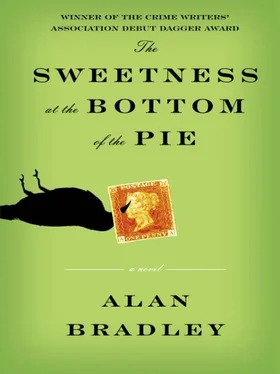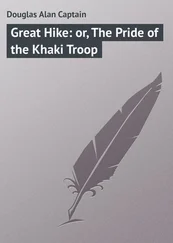Alan Bradley - The Sweetness at the Bottom of the Pie
Здесь есть возможность читать онлайн «Alan Bradley - The Sweetness at the Bottom of the Pie» весь текст электронной книги совершенно бесплатно (целиком полную версию без сокращений). В некоторых случаях можно слушать аудио, скачать через торрент в формате fb2 и присутствует краткое содержание. Жанр: Старинная литература, на английском языке. Описание произведения, (предисловие) а так же отзывы посетителей доступны на портале библиотеки ЛибКат.
- Название:The Sweetness at the Bottom of the Pie
- Автор:
- Жанр:
- Год:неизвестен
- ISBN:нет данных
- Рейтинг книги:3 / 5. Голосов: 1
-
Избранное:Добавить в избранное
- Отзывы:
-
Ваша оценка:
- 60
- 1
- 2
- 3
- 4
- 5
The Sweetness at the Bottom of the Pie: краткое содержание, описание и аннотация
Предлагаем к чтению аннотацию, описание, краткое содержание или предисловие (зависит от того, что написал сам автор книги «The Sweetness at the Bottom of the Pie»). Если вы не нашли необходимую информацию о книге — напишите в комментариях, мы постараемся отыскать её.
The Sweetness at the Bottom of the Pie — читать онлайн бесплатно полную книгу (весь текст) целиком
Ниже представлен текст книги, разбитый по страницам. Система сохранения места последней прочитанной страницы, позволяет с удобством читать онлайн бесплатно книгу «The Sweetness at the Bottom of the Pie», без необходимости каждый раз заново искать на чём Вы остановились. Поставьте закладку, и сможете в любой момент перейти на страницу, на которой закончили чтение.
Интервал:
Закладка:
"Don't look at me like that, my girl, or I'll give you reason to regret it."
And now he was clomping heavily down the main staircase! In another few seconds he'd see me. Just as I was about to make a bolt for the front door, a battered black taxicab stopped directly in front of it, the roof piled high with luggage and the wooden legs of a photographer's tripod protruding from one of its windows.
Tully was distracted for a moment.
"Here's Mr. Pemberton," he said in a stage whisper. "He's early. Now then, girl, I told you this would happen, didn't I? Get a move on and dump those dirty sheets while I find Ned."
I ran for it! Straight back past the sporting prints, into the back vestibule, and out into the inn yard.
"Ned! Come and get Mr. Pemberton's luggage."
Tully was right behind me, following me towards the back of the inn. Although momentarily dazzled by the bright sunlight, I could see that Ned was nowhere about. He must have finished unloading the lorry and gone on to other duties.
Without even thinking about it, I sprang up and into the back of the lorry, lay down, and flattened myself behind a pile of cheeses.
Peering out from between the stacked rounds I saw Tully stride out into the inn yard, look round, and mop his red face with his apron. He was dressed for pumping pints. The bar must be open, I thought.
"Ned!" he bellowed.
I knew that, standing in the bright sunlight as he was, he could not see me in the lorry's dim interior. All I had to do was lie low and keep quiet.
I was thinking that when a couple more voices were added to Tully's bellowing.
"Wot cheer, Tully," one said. "Thanks for the pint."
"S'long, mate," said the other. "See you next Saturday."
"Tell George he can hang his shirt on Seastar. Just don't tell 'im which shirt!"
It was one of those stupid things men say simply to get in the last word. There was nothing remotely funny about it. Still, they all laughed, and were probably slapping their legs, at the witticism, and a moment later I felt the lorry dip on its springs as the two climbed heavily into the cab. Then the engine grated into life and we began to move—backwards.
Tully was folding and unfolding his fingers, beckoning the lorry as it reversed, indicating with his hands the clearance between its tailgate and the inn yard wall. I couldn't jump out now without leaping straight into his arms. I'd have to wait until we drove out through the archway and turned onto the open road.
My last glimpse of the yard was of Tully walking back towards the door and Gladys leaning where I had left her against a pile of scrap lumber.
As the lorry veered sharply and then accelerated, I was beaned by a wheel of toppling Wensleydale and followed it, sliding, across the rough wooden floor. By the time I'd braced myself, the high road behind us was flashing by in a blur of green hedges, and Bishop's Lacey was receding in the distance.
Now you've done it, Flave, I thought, you might never see your family again.
As attractive as this idea seemed at first, I realized quickly that I would miss Father—at least a little. Ophelia and Daphne I would soon learn to live without.
Inspector Hewitt would, of course, have already jumped to the conclusion that I had committed the murder, fled the scene, and was making my way by tramp steamer to British Guiana. He would have alerted all ports to keep an eye out for an eleven-year-old murderess in pigtails and sweater.
Once they put two and two together, the police would soon set the hounds to tracking a fugitive who smelt like an Olde Worlde Cheese Shoppe. I would need to find a place to take a bath, then: a meadow stream, perhaps, where I could wash my clothes and dry them on a bramble bush. They would, naturally, interview Tully, grill Ned and Mary, and find out my means of escape from the Thirteen Drakes.
The Thirteen Drakes.
Why is it, I wondered, that the men who choose the names of our inns and public houses are so desperately unimaginative? The Thirteen Drakes, Mrs. Mullet had once told me, was given its name in the eighteenth century by a landlord who simply counted up twelve other licensed Drakes in nearby villages and added another.
Why not something of practical value, like the Thirteen Carbon Atoms, for instance? Something that could be used as a memory aid? There were thirteen carbon atoms in tridecyl, whose hydride was marsh gas. What a jolly useful name for a pub!
The Thirteen Drakes, indeed. Leave it to a man to name a place for a bird!
I was still thinking about tridecyl when, at the open tailgate of the lorry, a rounded, whitewashed stone flashed by. It had a familiar look, and I realized almost at once that it was the turnoff marker for Doddingsley. In another half mile the driver would be forced to stop—even if only for a moment—before turning either right to St. Elfrieda's or left to Nether Lacey.
I slithered to the lip of the open box just as the brakes squealed and the vehicle began to slow. A moment later, like a commando being sucked out the drop-hole of a Whitley bomber, I slipped off the tailgate and hit the dirt on all fours.
Without a backwards glance, the driver turned to the left, and as the heavy lorry and its load of cheeses lumbered away in a cloud of dust, I set off for home.
It was going to be a fair old trudge across the fields to Buckshaw.
9
I EXPECT THAT LONG AFTER MY SISTER OPHELIA IS dead and gone, whenever I think of her, the first memory that will come to mind will be her gentle touch at the piano. Seated at the keyboard of our old Broadwood grand in the drawing room, Feely becomes a different person.
Years of practice—come hell or high water—have given her the left hand of a Joe Louis and the right hand of a Beau Brummell (or so Daffy says).
Because she plays so beautifully, I have always felt it my bounden duty to be particularly rotten to her. For instance, when she is playing one of those early things by Beethoven that sounds as if it's been cribbed from Mozart, I will stop at the drop of a hat, whatever I may be doing, to stroll casually through the drawing room.
"First-rate flipper work," I'll say loudly enough to be heard above the music. "Arf! Arf! Arf!"
Ophelia has milky blue eyes: the sort of eyes I like to imagine blind Homer might have had. Although she has most of her repertoire off by heart, she occasionally shifts herself on the piano bench, folds a bit forward at the waist like an automaton, and has a good squint at the sheet music.
Once, when I remarked that she looked like a disoriented bandicoot, she leapt up from the piano bench and beat me within an inch of my life with a rolled-up piano sonata by Schubert. Ophelia has no sense of humor.
As I climbed over the last stile and Buckshaw came into view across the field, it almost took my breath away. It was from this angle and at this time of day that I loved it most. As I approached from the west, the mellow old stone glowed like saffron in the late afternoon sun, well settled into the landscape like a complacent mother hen squatting on her eggs, with the Union Jack stretching itself contentedly overhead.
The house seemed unaware of my approach, as if I were an intruder creeping up on it.
Even from a quarter of a mile away I could hear the notes of the Toccata by Pietro Domenico Paradisi—the one from his Sonata in A Major—come tripping out to meet me.
The Toccata was my favorite composition; to my mind it was the greatest musical accomplishment in the entire history of the world, but I knew that if Ophelia found that out, she would never play the piece again.
Whenever I hear this music it makes me think of flying down the steep east side of Goodger Hill; running so fast that my legs can barely keep up with themselves as I swoop from side to side, mewing into the wind, like a rapturous seagull.
Читать дальшеИнтервал:
Закладка:
Похожие книги на «The Sweetness at the Bottom of the Pie»
Представляем Вашему вниманию похожие книги на «The Sweetness at the Bottom of the Pie» списком для выбора. Мы отобрали схожую по названию и смыслу литературу в надежде предоставить читателям больше вариантов отыскать новые, интересные, ещё непрочитанные произведения.
Обсуждение, отзывы о книге «The Sweetness at the Bottom of the Pie» и просто собственные мнения читателей. Оставьте ваши комментарии, напишите, что Вы думаете о произведении, его смысле или главных героях. Укажите что конкретно понравилось, а что нет, и почему Вы так считаете.












